– Point-based returns will end in September 2025, quietly stripped from us.
🎯 Purpose of This Article
This article is for those who want to understand what’s really going on behind the ban on point rewards in the Furusato Nozei (hometown tax donation) system.
While the government claims it’s about “making the system healthier,” the reality shows a different picture:
Who benefits, who loses, and why the public is silently being stripped of their returns.
We’ll explore the structure, the beneficiaries, and where the responsibility truly lies.
Chapter 1|Furusato Nozei Is a Good System – Or It Was
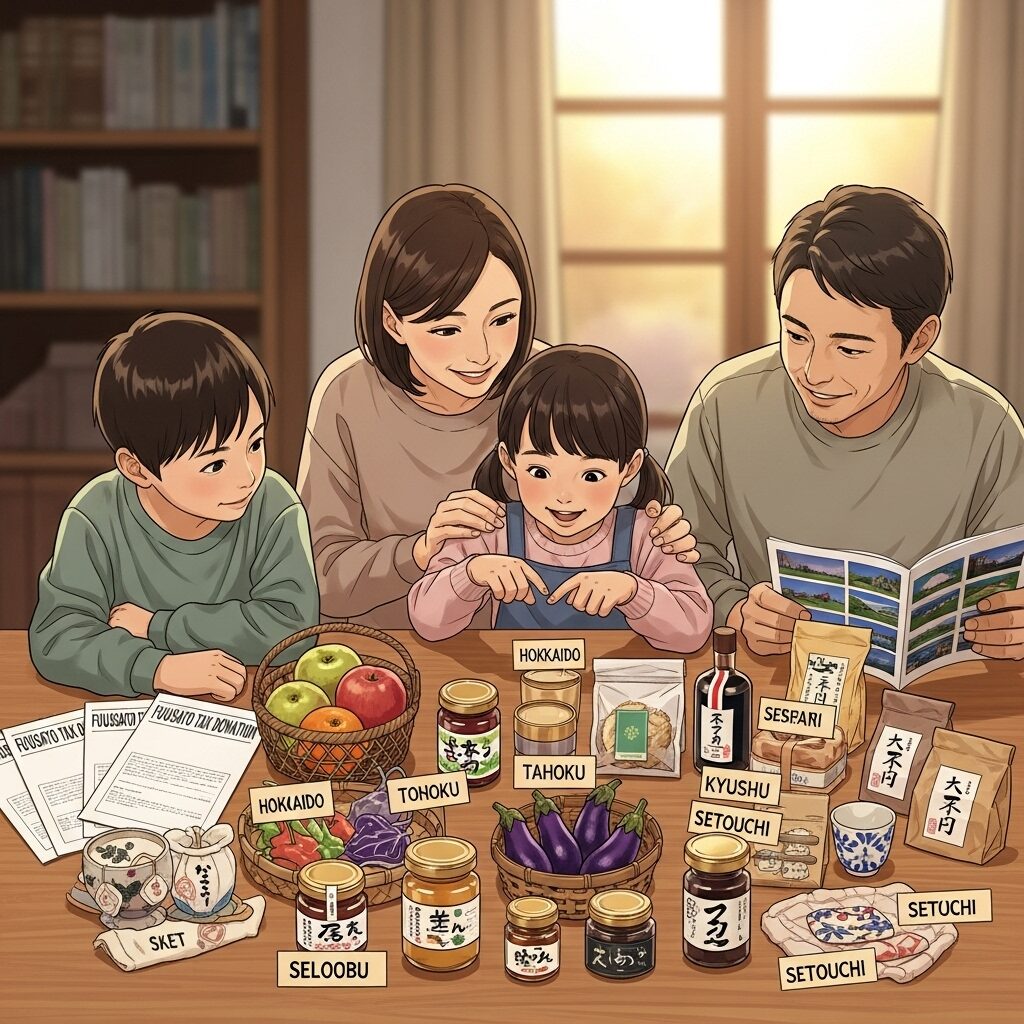
Furusato Nozei is, at its core, a good idea.
Even if you live in the city, you can choose to support local communities through your taxes.
Instead of your taxes being taken without say, you could pick which areas to support. That kind of “choice” is empowering.
The return gifts weren’t just freebies — they sparked curiosity about those regions. A delicious gift often led to actual visits and travel.
And the rules were clear:
- Return gifts worth up to 30% of the donation
- ¥2,000 self-pay only
- Tax deductions within set limits
In other words, it was a well-balanced win-win system: You support local areas and gain something in return.
I used to enjoy picking gifts with my family every year, thinking, “This system really works.”
But then… came that notice.
To be honest, I just wanted to get back a little from the taxes I was forced to pay.
Why should that be called “wrong”?
Why must we always lose quietly?
Chapter 2|The System Quietly Changed in Fall 2024
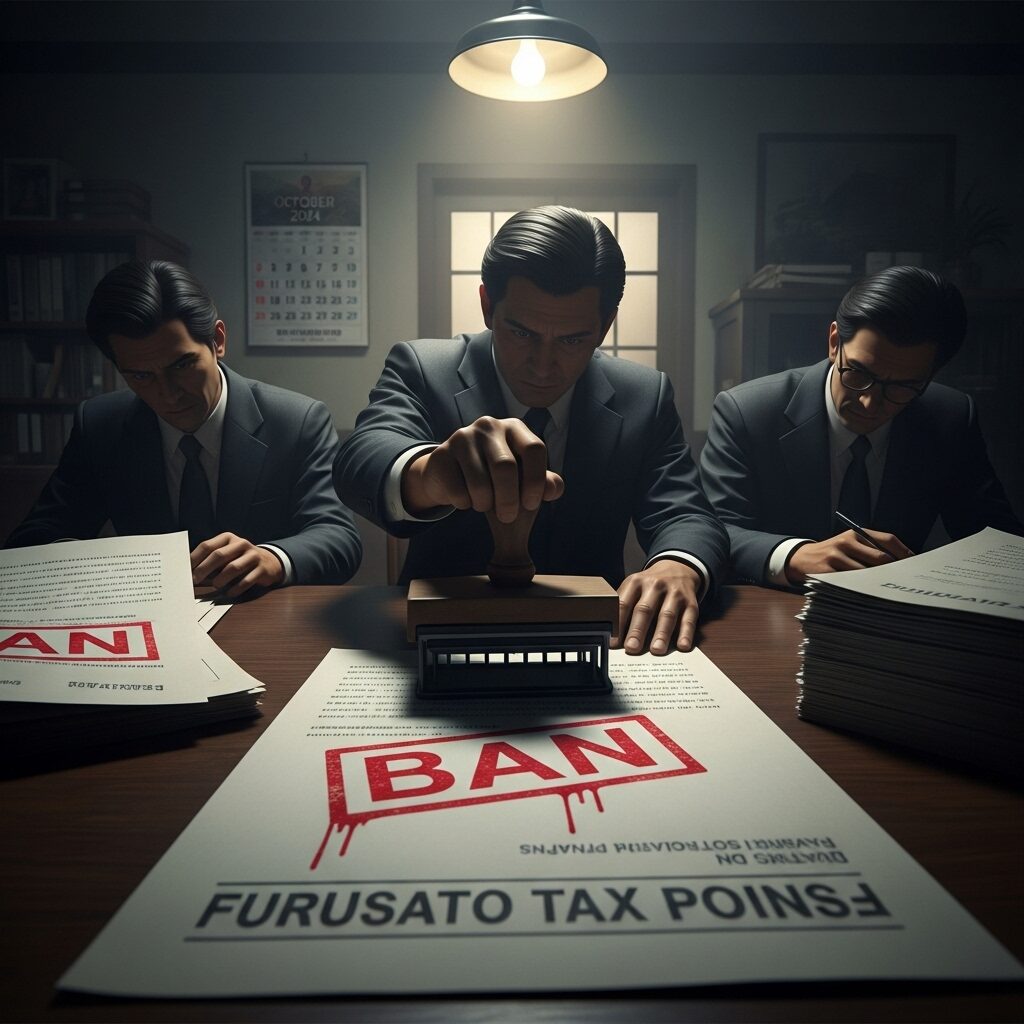
In October 2024, the Ministry of Internal Affairs and Communications issued a notice banning point rewards for Furusato Nozei.
The official reason?
“Excessive competition undermines the spirit of the system.”
That sounds reasonable — but it felt off.
Point rewards were the reason many chose certain donation platforms.
Suddenly calling it “against the system’s purpose”? That shift felt more like a signal — something was changing behind the scenes.
Platforms like Rakuten Furusato Nozei, which excelled in point-based marketing, were hit hard.
Here’s what happened after the ban:
- Citizens: Lost their points — i.e., lost part of their tax return
- Platforms: Lost their competitive edge
- Local governments: Still paid high fees, but had less appeal to donors
If points were banned but excessive handling fees were left untouched…
Then clearly, someone else is benefiting from this.
Chapter 3|Who Gained and Who Lost?
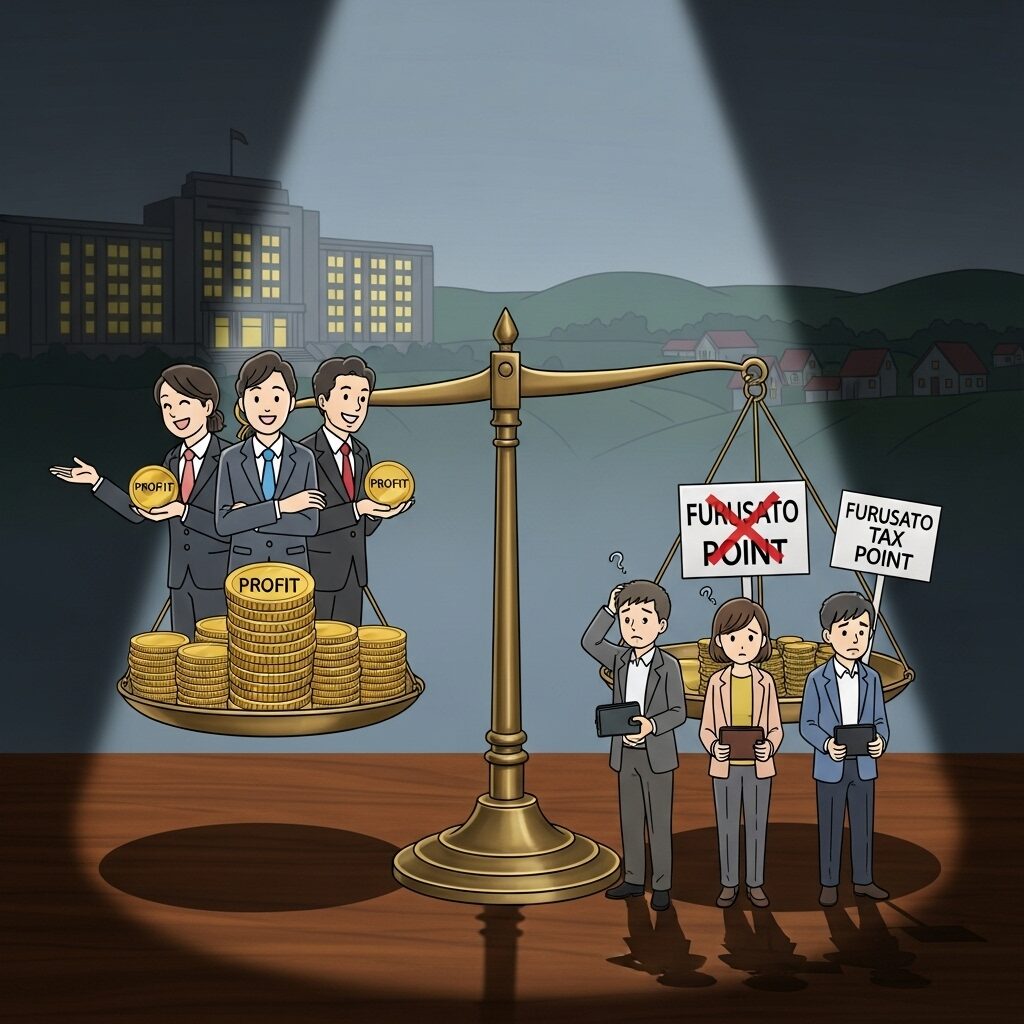
Winners:
✔️ Intermediary companies (platforms)
They previously covered part of the point rewards. Now, with the ban:
→ Their profit margins increased.
Losers:
❌ Citizens:
Used to get real value back through points. Now, with only the gift, the ¥2,000 self-pay feels heavier.
❌ Local governments:
Still paying up to 20% of donation value as fees to platforms.
With fewer donations post-ban, they lose funds they could’ve used freely.
❌ Point-driven platforms like Rakuten:
They built strategies around point-based competition. With that gone, their strengths are nullified.
➡️ In short:
Those who thrived on point competition were crushed.
Only unrelated businesses gained.
And for us? It’s not just “bad vibes” — we truly lost value in our taxes.
Chapter 4|Points Are Banned. Fees Stay. Does That Make Sense?

This ban was led by the Ministry of Internal Affairs, especially by Yuya Hasegawa, Assistant Section Chief of the Municipal Tax Division.
He’s been quoted saying:
“Using points or gifts for tax-saving is against the system’s purpose.”
Fine. But what about the excessive fees behind the scenes?
Example:
- Donation of ¥50,000 → Up to ¥10,000 (20%) in fees
- Services include listing, payment handling, shipping support
- Yet, local governments can’t choose platforms freely
- Some even covertly paid for points despite “company-funded” claims
So now:
Points banned = OK. But fees untouched = Also OK?
That’s not “reform.” That’s selective censorship.
Hiding behind the term “system improvement” while leaving deep-rooted distortions intact is unacceptable.
Chapter 5|Who Gave the Final Green Light?
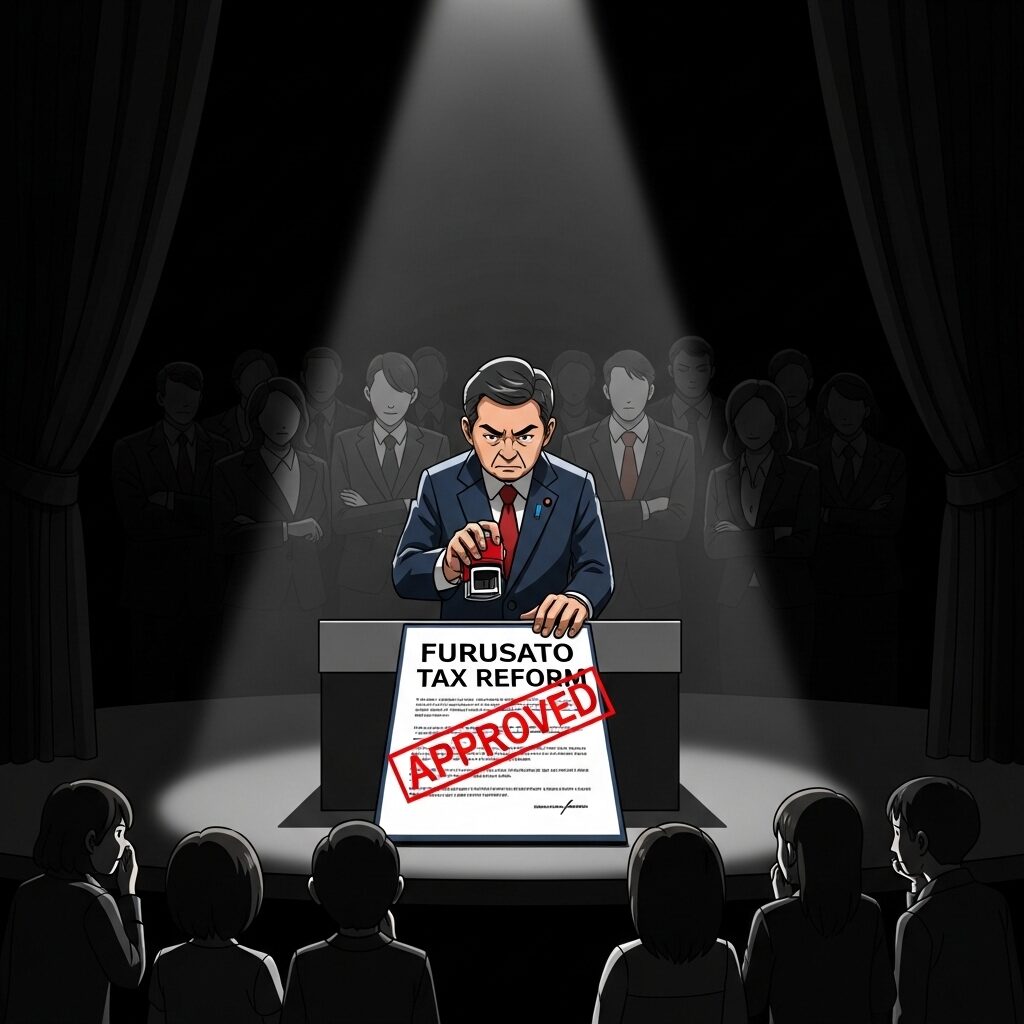
The final stamp of approval came from then Minister of Internal Affairs: Takamasa Matsumoto (LDP).
Even if an assistant manager led the policy, it wouldn’t have passed without ministerial approval.
So is this only a bureaucratic issue?
No. It’s political too.
Let’s break it down:
- Citizens: Lost benefits
- Local governments: Lost donations
- Platforms: Lost marketing tools
- Intermediary firms: Gained profits
- Politicians: Gained “reform points,” appeased fiscal interests, ensured future corporate support
In other words, this was a politically convenient reform.
They protected profits and suppressed dissent — quietly.
Supplemental|How Bureaucrats Quietly Benefited
Bureaucrats didn’t pocket cash directly.
But they gained influence and future perks.
- Amakudari (post-retirement jobs)
Some platform companies hired ex-bureaucrats as “advisors.”
Friendly regulations today = high-level jobs tomorrow. - Reform results for promotion
“Fixing the system” = Good on paper = Promotion - Responsibility dodging
Points = Banned
High fees = Ignored
→ Convenient for both companies and officials
That’s the core of this quiet extraction mechanism.
Chapter 6|Who Is This System Really For?
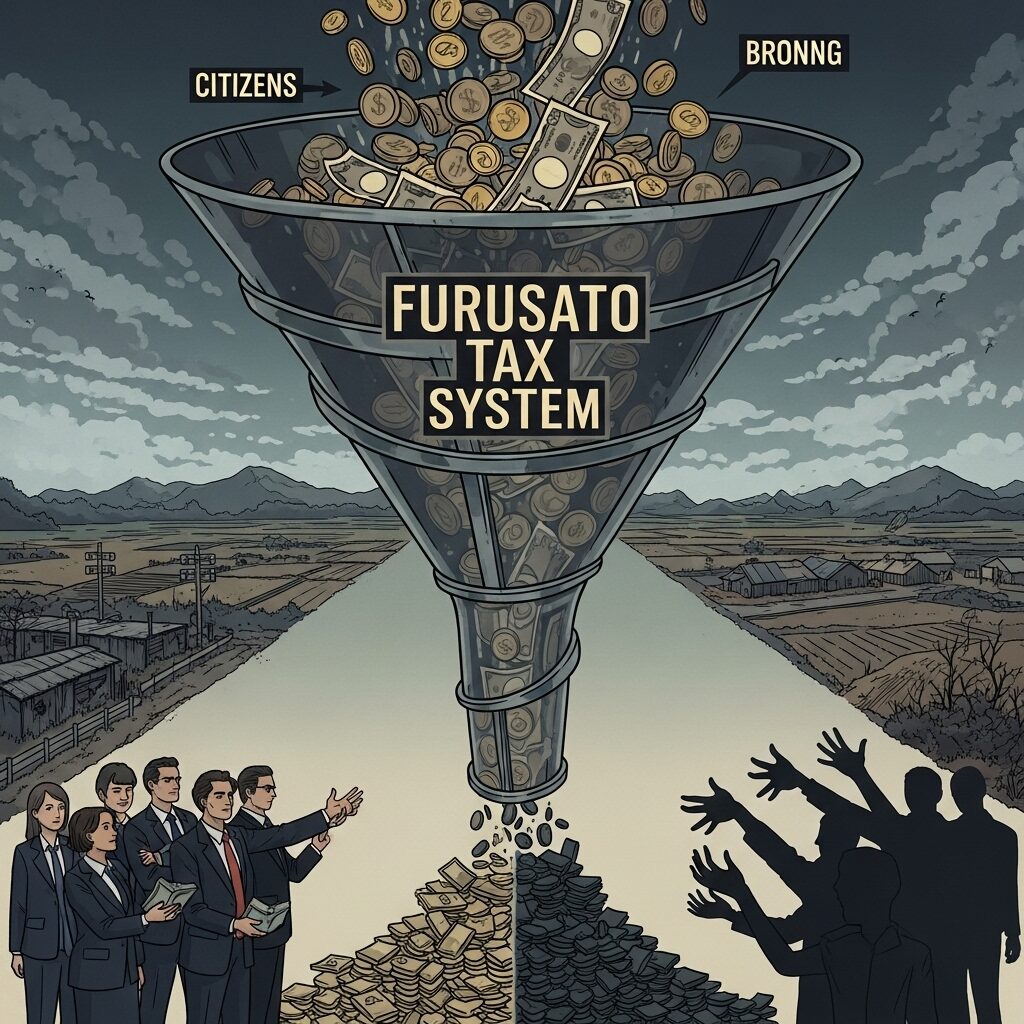
Furusato Nozei was supposed to let us support regions we care about.
But now, it looks like this:
A mechanism where tax money flows indirectly to corporations.
Return gone. Burden stays. Profits remain.
Let’s be clear — not all companies are bad.
| Platform | Point Usage | Impact of Ban |
| Rakuten / au PAY | Gave points to users | Major damage. Lost competitive edge |
| Satofull / Furunavi / Furusato Choice | Minimal or no points | Less affected, even gained advantage |
What’s wrong is targeting only point-based competition while keeping the fee business untouched.
That’s not reform — that’s selective enforcement.
We wanted to support.
Now we’re just being quietly harvested.
Chapter 7|This Is Why I Choose to Speak Up

I’m not rejecting the Furusato Nozei system.
Used right, it’s still a great idea.
But this shift —
Where no one takes responsibility, and only the public quietly loses —
That’s not something I can overlook.
Too many people are unaware of how they’re being quietly shaved away.
And in other areas too — like iDeCo (private pension savings):
- Touted as tax-saving
- But withdrawal now taxed
- Payouts now stretched to 10 years instead of 5
→ Less chance to fully use retirement tax breaks
Politicians can be voted out.
Bureaucrats? Their names stay hidden.
We need accountability.
And if the politicians won’t hold them accountable, we must vote accordingly.
This is not just a system update.
This is a quiet shift of wealth and responsibility, taken from the people and handed to power.
I hope more people quietly grow angry — not at the system itself, but at the distortion behind it.
Only by noticing can we resist.
- ※This article reflects the author’s views and independent research as a form of social commentary. It does not assert definitive claims about all underlying structures or intentions. For the latest updates or official positions, please refer to government announcements.
▶ Related Articles (in English)
Only three pitches left – and I still throw: a little story about life and baseball
When we sense something’s off, even slightly – what can we really do?
What I learned about “protection” on a stormy day
Disasters and systems alike – the real danger lies in the risks we fail to notice.
“People First” is a lie – When writing “Democratic Party” sends your vote elsewhere
In this country, names mislead and votes are diverted – is that really democracy?



コメント